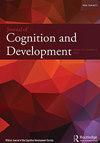Children’s Developing Understanding of the Subjectivity of Intentions – A Case of “Advanced Theory of Mind”
IF 1.6
2区 心理学
Q3 PSYCHOLOGY, DEVELOPMENTAL
引用次数: 0
Abstract
ABSTRACT When and how do children develop an understanding of the subjectivity of intentions? Intentions are subjective mental states in many ways. One way concerns their aspectuality: Whether or not a given behavior constitutes an intentional action depends on how, under which aspect, the agent represents it. Oedipus, for example, intended to marry Yocasta, but did not intend to marry his mother (even though in fact, but unbeknownst to him, Yocasta was his mother). In the present study, we investigated the trajectories and determinants of children’s developing understanding of (less dramatic forms of) the aspectuality of intentions. In two studies, children aged 3–9 observed an agent who acted intentionally but based on some mis-representation regarding the target of her action. The agent grasped a box that contained A and B while believing that it only contained A but not B. Children were asked about the aspectuality of the agent’s intention (in particular, whether she intended to grasp B). When asked to do so spontaneously, children younger than 8 failed (falsely claiming that the agent intended to grasp B). In contrast, in a simplified format in which children were scaffolded through the required inferential chains, children from age 6 succeeded. Children’s general capacity for meta-representation appeared to be necessary but not sufficient by itself for understanding the aspectuality of intentions. The present findings suggest that the appreciation of the aspectuality of intentions is part of an advanced theory of mind that develops in much more protracted ways than basic theory of mind.儿童意向主体性理解的发展——以“高级心理理论”为例
儿童何时以及如何发展对意图主观性的理解?意图在很多方面都是主观的心理状态。一种方法涉及它们的方面:给定行为是否构成有意行为取决于代理如何,在哪个方面下表示它。例如,俄狄浦斯打算娶约卡斯塔,但不打算娶他的母亲(尽管事实上,但他不知道,约卡斯塔是他的母亲)。在本研究中,我们调查了儿童发展理解的轨迹和决定因素(不那么戏剧性的形式)的意向方面。在两项研究中,3-9岁的儿童观察到一个行为主体故意行为,但基于对其行为目标的一些错误描述。代理抓住了一个包含a和B的盒子,同时相信它只包含a而不包含B。孩子们被问及代理意图的独特性(特别是她是否打算抓住B)。当被要求自发地这样做时,8岁以下的孩子失败了(错误地声称代理打算抓住B)。相比之下,在儿童通过所需的推理链搭建的简化格式中,6岁以上的孩子成功了。儿童对元表征的一般能力似乎是必要的,但它本身并不足以理解意图的特殊性。目前的研究结果表明,对意图的独特性的欣赏是一种先进的心理理论的一部分,这种理论的发展比基本的心理理论要漫长得多。
本文章由计算机程序翻译,如有差异,请以英文原文为准。
求助全文
约1分钟内获得全文
求助全文
来源期刊

Journal of Cognition and Development
Multiple-
CiteScore
4.00
自引率
0.00%
发文量
29
期刊介绍:
The Journal of Cognition and Development is the official journal of the Cognitive Development Society (CDS). Some CDS members are concerned with basic research or theory; others focus on policy issues and practical applications. The range of interests includes cognitive development during all stages of life, and we seek to understand ontogenetic processes in both humans and nonhumans. Finally, their interests encompass typical as well as atypical development, and we attempt to characterize both biological and cultural influences on cognitive change and continuity.
 求助内容:
求助内容: 应助结果提醒方式:
应助结果提醒方式:


